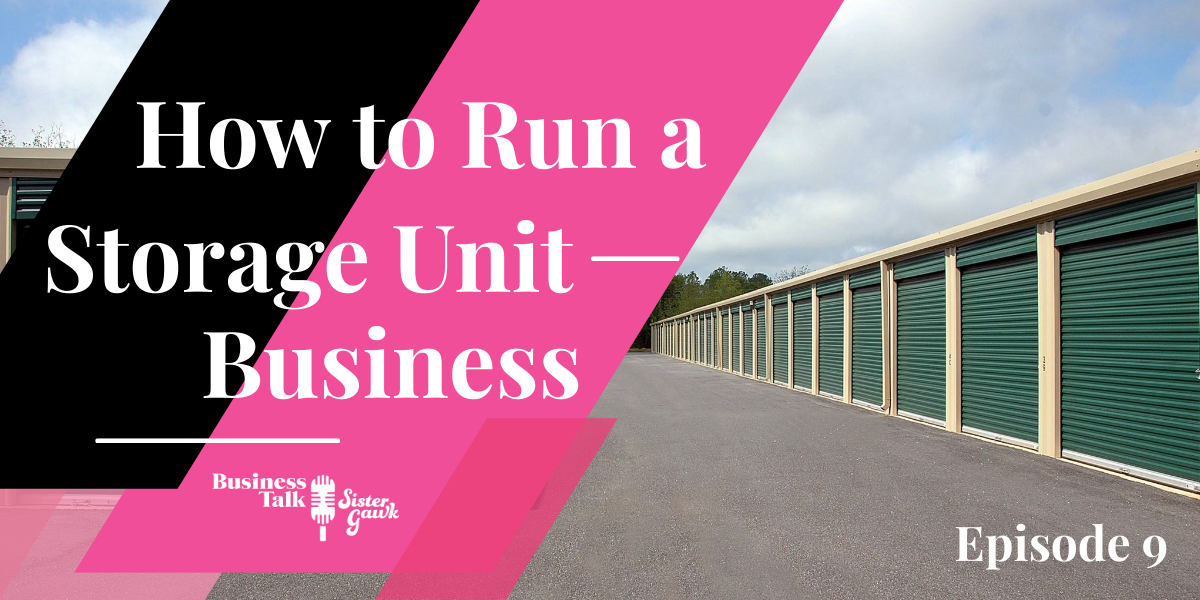In this episode, we interview Tim VanSoest about his acquisition of a storage unit business. We cover overall operating costs, how he went about deciding the investment was worth his time, and the weirdest things he’s ever seen while running a storage unit company. It’s a fun time all around to learn about buying a business.
On today’s episode, we call in Tim VanSoest. A man who has had business flowing through his blood even from a young age. His wisdom and tact in acquiring and maximizing profitability help us better understand the value of knowing the numbers when pursuing a new business venture.
Bekkah: And today we are talking with Tim VanSoest about storage units! Thanks so much for being with us here today.
Tim: Happy to be here!
Bekkah: Your enthusiasm is overwhelming. Okay, so our first question for you is “What do you do?”
Tim: That’s a good question I oftentimes ask myself the same thing. I’ve owned a number of businesses over the years and now in my early 40’s, I flip houses doing most of the construction work myself. I also own a couple of other businesses. The one we’re talking about today is a group of activities that I acquired about four years ago and in that business there are storage units. Like the mini storage units, then I have some highway billboard signs, and I also have residential and commercial rentals on this property as well.
Bekkah: Yeah so today we just want to talk about the storage units. Just so you guys know we’re going to be talking about next week the billboard side of it, because we have a lot of questions about that, as well. Because Tim has so much experience with all these different things, we’ll probably have them back in the future as well to talk about what does it look like to ever look into owning a franchise and a bunch of other things that he’s done in his life. Quite an interesting person despite what you may hear of his personality. He’s actually a really funny guy.
Ruthie: And he’s got a fun spelling of his last name. it looks like “Van Soest” like “toast”. “Van toast”.
How Did You Get Started in Purchasing Storage Unit Business?
Tim: Yeah. I guess at this point in my life a lot of the business opportunities that I look at are somewhat driven by cash flow. What a business is producing and then if I see upside in creating additional cash flow inside of that business by improving operations or adding additional revenue lines. In this particular case it met a lot of that criteria, it was also close to home. And it is fairly hands-off and so from an investment standpoint it doesn’t require tremendous amount of my time and still provides me a level of cash flow that that helps me live life. Now I had to do a bunch of things before getting into this business to raise the required capital to get into a business like this, because it is a business that upfront requires a high level of investment to get that return over time.
Ruthie: Yeah so tell us a little bit about that. What did you need in order to get started? Did you have a pre-existing building or did you remodel one? Did you build new? What did that look like?
Tim: Sure! This was an established facility, so I just bought it! It was really simple. Yeah, acquiring businesses is much easier and faster than starting them once you have the capital to do it with.
Bekkah: How did you decide that it was gonna be a profitable investment though?
Tim: Oh! Absolutely! That all starts with the financial statements and taking time to vet the financial statements. One of the things I love about acquiring an existing business is that you can do that. When you do a startup there’s just a ton of question marks. When you’re acquiring a business there’s a lot less question marks, but you have to still do your homework, in the sense that you have to look at the financial statements. You want to look at at least three or four years of history that the owner including their tax statements. You really want to spend time digging into those to make sure that they’re being honest with you that everything that they’re presenting is true and accurate.
Inside of those financial statements, oftentimes, you can find windows of opportunity. Are there ways that I can reduce costs? Are there things in this business that I could be doing myself instead of hiring out? Do I have additional contractors and so forth that I know of that will get me a better rate on making improvements or building additional buildings or maintaining things? Snow plowing in this case. All of those things.
If I can better negotiate than what the current owner is doing, all those things are areas of opportunities. Those are things that we look for when we start evaluating the business. The other thing I think is patience. Waiting for the right opportunity. There’s a lot of businesses that come along and that I’ve evaluated over the years that I don’t buy. I evaluate a lot more of them than I actually purchase, because through that evaluation I’m learning things about the business for free. Just by taking time to look at what that individual business has done and I oftentimes decide that this isn’t something that is worth my effort. It’s not something that’s worthy of my investment.
It could be different for somebody else, but I guess that leads me down the path of having criteria going into it for yourself. What are you expecting to earn? What’s your time worth? What is your money worth? Knowing ahead of time what your criteria are so that you don’t fall into something, just because it emotionally feels good or you kind of fall in love with the business. That’s not been my approach. Never did I fall in love with owning mini-storage buildings.
Bekkah: That’s an attractive job title though.
Tim: Yeah. Absolutely. “Mini-Storage Building Owner” It’s yeah, very impressive.
Bekkah: People want to be your best friend when they hear that.
Tim: Yeah usually, that doesn’t usually work that way. It’s a non-emotional practical evaluation of financial statements. Thankfully, at my college education really helped with my ability to analyze financial statements I feel. I went to school to be an accountant. I’m familiar with looking at tax returns from that experience and that’s only grown through the years.
How Do You Know If A Business Has Good Financials?
Ruthie: When you said that you had to look at those financial statements and stuff like that did the previous owner provide you with that or was that all just you kind of doing some data mining and having to look on public resources for that information.
Tim: No, in this case. I have definitely found public resources to be helpful at times and in to research, for example, what should my expectations be around occupancy rate for storage units. There’s all kinds of data about those types of things. For example, one of the things that I did before buying the business was I subscribed for free to a national storage, mini storage Association that publishes a magazine and they’ll send it to you for free.
A lot of business resources like that will send you these magazines for free and you can research just by reading articles in those. Kind of get to know the business before you actually acquire it or look at acquiring it. If you have an area of interest those resources can be really helpful at little to no cost. But in this case, the owner who was trying to sell the property just provided their financial statements directly to me. That’s pretty typical that they would have that information available.
If they’re running I would say “clean” financial set of books already. Mot all businesses are going to be that way. So in those cases you’d have to do a lot more digging. You should get a much “better value” on the business when an existing owner doesn’t have “clean” financials to look at because you’re making a lot more assumptions. In this case, for this business, they had very good financials and I was able to rely on those heavily as I evaluated the business.
How Do Clean Financials Help You Sell Your Business?
Bekkah: Yeah that’s even a good tip, if you ever looking to sell a business in the future! You should have good financials if you’re gonna get your money’s worth out of it at the end.
Tim: Oh, absolutely! I have worked with a lot of business owners over the years. Especially, in the franchise restaurant space in terms of “How do I price my business when I’m going to sell it?” More often than not I run into business owners who don’t keep clean financials and it really hurts them in the long run. They might be trying to play some games around how much they pay in taxes. They might want to underreport their income and over report their expenses to the IRS and have this going on for years where they think they’re saving all kinds of money. They are in those moments, but I tell them for at least three years before you want to sell your business you have to clean up your financial books.
Because somebody coming in is going to pay a lot more for a business that’s producing a hundred thousand dollars in cash flow than one that looks like it’s producing twenty-five thousand dollars in cash flow. I find great, great benefit in the long run and just being honest with your books. Keeping them clean and my accountant always said, “Hey, it’s a good thing when you’re paying income taxes, because it means you’re making money.”
How Much Did Location Affect You Buying a Storage Unit Business?
Bekkah: How much did location play into the storage unit aspect of thinking about even if someone was gonna build new or remodel a space to use it as a storage unit. How strategic do you need to be with location?
Tim: At least in the area that we live in in northern Minnesota location isn’t so important as in a metro area for this business. People will drive along your distance to get to a facility just because transportation is so easily accomplished here. If it’s 15 miles away it means it’s like 15 minutes away, so that’s not as much of a barrier.
Bekkah: Okay. In this business do you think that if you were to scale or anything would employees be valuable to this type of business or is it not necessarily that essential?
Tim: It’s not essential. It all depends on how much time I want to spend in the business. Just like any property, there’s a lot of things to take care of. Right now I do those things. But it would be advantageous if I wanted to pursue other things that were taking up more of my time and or save things that didn’t allow me the flexibility to meet somebody to rent a storage unit at 2:00 p.m. on a Tuesday when it’s convenient for them.
Then I think I’d want to have an employee on board to take care of some of those things for me. That would become more important as a business like this would would scale up. For me I only have about 60 individual units. Which is, actually, on the smaller side. I know there’s some local operators that have 300, 400 units with multiple physical locations that are you know 10, 15, 20 miles apart from each other. Usually, those guys are employing a full-time employee or a couple full-time employees to manage all the ins and outs and the cleaning and snow plowing and all those types of things.
Which is easier? House rentals or storage rentals?
Tim: Oh storage rentals way easier than residential rentals.
Ruthie: What do you like more?
Tim: I would take the starch business any day over residential rentals.
Bekkah: How do you come from getting burned? There’s like storage wars where people bid on getting someone’s stuff that they didn’t pay rental fee for whatever and they’ve left all their junk there. How do you keep from having that happen to you?
Tim: I mean that happens a couple times a year to me where somebody will stop paying rent and kind of abandon their property. Then it gets auctioned off and usually my return on that is far into the negative because of the required legal notices that have to take place. You’ve gotta advertise in the paper. You’ve got to send certified letters and by that time they are you owe you four five, six months of rent. Minimizing that is making sure to track who’s paying and who’s not. Having a good record-keeping system of payments and invoices.
I use QuickBooks for that it’s pretty straightforward and simple. If I was have a had a bigger facility there’s some specialized solutions that the industry offers. Software specifically designed for this business, but or me QuickBooks works okay. It allows me to keep on top of it when somebody falls behind. Making phone calls and sending letters to try to get them back on board. I’m offering them flexible payment arrangements, trying to keep them current. If they do fall too far behind then it’s just all about being on top of taking care of the legal steps in order and in a timely matter to try to minimize the loss.
Ruthie: What is your process for allowing people to apply to have one of your storage units?
Tim: It’s really simple they just have to call, text, or email me and I will rent to them.
Bekkah: Do you require a down payment or anything?
Tim: We don’t have the criteria that a residential rental unit would have where there’s a background check and a credit check or whatever. None of that takes place for me in the storage rental game. Part of that is because the window for foreclosure is very short when it comes to this business. The legal foreclosure process can start taking place as soon as they’re three months behind. The eviction process in residential rentals is much more complicated than that. You’re also talking about a bigger portion of your income coming from that one person. A residential rental is gonna go for what five hundred to a thousand dollars, maybe more, a month. My business has split up over 60 different customers and each person is paying me somewhere between forty and a hundred dollars a month. My risk is really spread out among a much broader base of people, which allows us to kind of approach renting in a different manner.
What Would You Recommend to Anyone Looking to Start A Storage Business?
Tim: that wants to start a new mini-storage business is that your question?
Bekkah: Yes, getting into this specific kind of business.
Tim: I think building new facilities today with the current price around materials, especially, steel and concrete can make the entry point to these a little bit difficult. Unless you’re coming in with a fairly large down payment, where you’re not going to be required to finance a large portion of this. That way you can weather a little bit better the ups and downs, especially, early on as you’re trying to fill them. That way you don’t have a large payment in your way that you may or may not be able to make. Because ramping these up does take time. That’s one advantage to buying an existing one.
When I bought these I was already at a like a ninety-five percent occupancy rate so I had cash flow on day one. But if you’re building a new building and a new site that cash flow is gonna start at zero percent occupancy, because I’m the first day you open you’re not going to have any tenants. You have to ramp that over time which could take several years to get there. If you’re going to start a new one, you really have to be prepared to weather that early cash flow challenge and then you know be ready for economic events that might cause people to move out. In a lot of regards, Mini Storage is a discretionary expense for people.
It gives them a space to put stuff that maybe they don’t want to look at at their house or a boat that maybe doesn’t really need to be inside but they prefer it to be. As economic downturns come we can see a lower occupancy rate and we can definitely see a higher delinquency rate as this is one of the things that people won’t pay. If you’re gonna start new, I would strongly encourage you to have a good amount of cash flow set aside for those rainy days.
Bekkah: Okay! We have one more question. We’ll try to make it short and then we’re gonna do the gawk part of our episode where we talk about something stupid. What free tools or resources would you recommend?
Tim: I mentioned the industry magazines. That would span beyond just this specific business. I’m not big into free resources. I am big into working hard and utilizing knowledge but I would say using your network of people has probably been one of the biggest things for me. Get to know experts through people that you know. That can take place in person which is probably the most effective or you can obviously utilize things like LinkedIn, but if you want to know about a business start figuring out who do you know that knows somebody that has one of those businesses.
In our current state of internet and how easy it is to find out things about people – start looking around! If you want to know about storage buildings, start looking for who owns them. Figure out from property records “who owns storage units around me”. Or if you’re afraid that it’s gonna be they’re not going to share things with you because it’s competitive, well, look 200 miles away to where maybe you have a relative. Then say, “Hey, I found out that Joe Johnson owns the storage unit in your town do you happen to know him or do you know somebody that knows him?” so that you could start having those connections. Then go out there! Have lunch with the guy; see what he can tell you about the business.
Bekkah: Basically like Facebook stalking, but with government property records?
Tim: Yeah!
Bekkah: Essentially!
Ruthie: Maybe with more noble intentions, I guess.
Bekkah: Thanks for joining us Tim! We’ll see you all next week!




